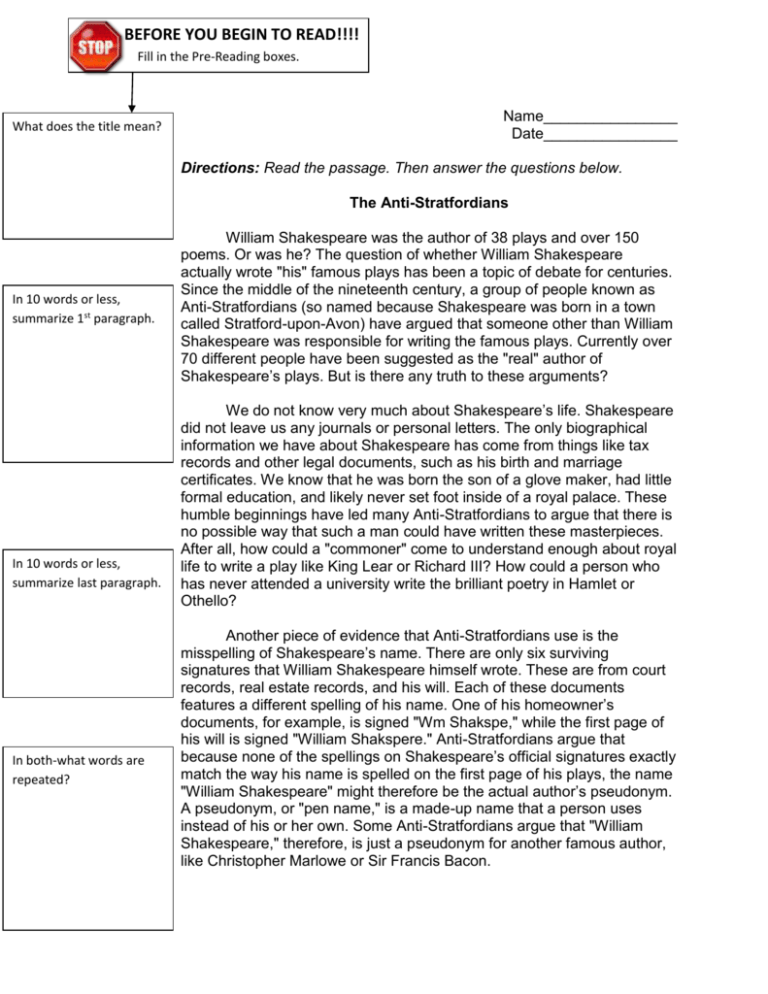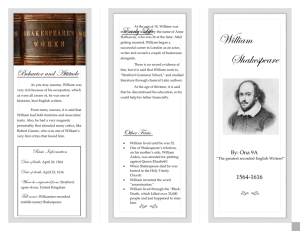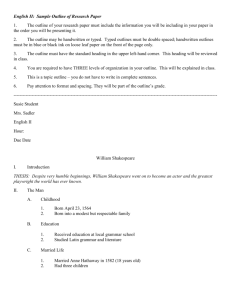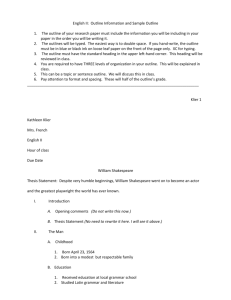
BEFORE YOU BEGIN TO READ!!!!
Fill in the Pre-Reading boxes.
What does the title mean?
Name________________
Date________________
Directions: Read the passage. Then answer the questions below.
The Anti-Stratfordians
In 10 words or less,
summarize 1st paragraph.
In 10 words or less,
summarize last paragraph.
In both-what words are
repeated?
William Shakespeare was the author of 38 plays and over 150
poems. Or was he? The question of whether William Shakespeare
actually wrote "his" famous plays has been a topic of debate for centuries.
Since the middle of the nineteenth century, a group of people known as
Anti-Stratfordians (so named because Shakespeare was born in a town
called Stratford-upon-Avon) have argued that someone other than William
Shakespeare was responsible for writing the famous plays. Currently over
70 different people have been suggested as the "real" author of
Shakespeare’s plays. But is there any truth to these arguments?
We do not know very much about Shakespeare’s life. Shakespeare
did not leave us any journals or personal letters. The only biographical
information we have about Shakespeare has come from things like tax
records and other legal documents, such as his birth and marriage
certificates. We know that he was born the son of a glove maker, had little
formal education, and likely never set foot inside of a royal palace. These
humble beginnings have led many Anti-Stratfordians to argue that there is
no possible way that such a man could have written these masterpieces.
After all, how could a "commoner" come to understand enough about royal
life to write a play like King Lear or Richard III? How could a person who
has never attended a university write the brilliant poetry in Hamlet or
Othello?
Another piece of evidence that Anti-Stratfordians use is the
misspelling of Shakespeare’s name. There are only six surviving
signatures that William Shakespeare himself wrote. These are from court
records, real estate records, and his will. Each of these documents
features a different spelling of his name. One of his homeowner’s
documents, for example, is signed "Wm Shakspe," while the first page of
his will is signed "William Shakspere." Anti-Stratfordians argue that
because none of the spellings on Shakespeare’s official signatures exactly
match the way his name is spelled on the first page of his plays, the name
"William Shakespeare" might therefore be the actual author’s pseudonym.
A pseudonym, or "pen name," is a made-up name that a person uses
instead of his or her own. Some Anti-Stratfordians argue that "William
Shakespeare," therefore, is just a pseudonym for another famous author,
like Christopher Marlowe or Sir Francis Bacon.
5 words or less
Main Idea:
Author’s Purpose:
Author’s Point of View:
Fiction or Non-Fiction?
Prediction:
Although Anti-Stratfordians use the evidence of Shakespeare’s
humble beginnings and his signatures to suggest that he did not write the
plays, there are other important factors to consider. Arguing that
Shakespeare could not have written about royalty because he was a
commoner, or that he could not have written beautiful poetry because he
was uneducated, is not only insulting, it is wrong. There have been
hundreds of authors throughout history who wrote masterpieces of
literature without having had the benefit of formal education. As for his
"misspelled" name, it is true that he spelled his name six different ways on
six different documents, and that none of these spellings match those on
his plays. However, while this may seem strange to modern readers, it
was not unusual for people in that time period. During Shakespeare’s day,
spelling was much more informal than it is today. The word "queen," for
example, was also spelled "queene," "quean," and "queane."
Furthermore, there is quite a bit of convincing evidence that
suggests Shakespeare actually did write the plays. Other authors from
Shakespeare’s time period wrote about a man named Shakespeare who
wrote and acted in plays. In his will, Shakespeare left money to famous
actors who performed in his plays. Finally, there are no records
whatsoever of anyone from Shakespeare’s time period wondering who
wrote any of his plays: none of Shakespeare’s contemporaries ever
suggested that the name "William Shakespeare" was a pseudonym.
Questions
1) Despite all of this evidence, why might people be so eager to prove that
Shakespeare didn’t really write any of Shakespeare’s plays? It is certainly
an interesting idea, and many people enjoy having mysteries to solve.
Maybe, however, the real reason driving this idea is the fact that some
people just have a hard time accepting that one person—especially a
person who never had a formal education—was responsible for some of
the greatest literature ever written.
The main purpose of the passage is to
2) In paragraph 1, the author writes: “The question as to whether William
Shakespeare actually wrote ‘his’ famous plays has been a topic of debate
for centuries.” The author most likely put the word “his” in quotation marks
to
3) As used in paragraph 2, which is the best antonym for humble?
4) Which of the following accurately describes the organization of this
passage?
5) According to the passage, which facts do Anti-Stratfordians use as
evidence to support their claims about the authorship of Shakespeare’s
plays?
6) At the end of paragraph 3, we learn that "Some Anti-Stratfordians argue
that "William Shakespeare," therefore, is just a pseudonym for another
famous author, like Christopher Marlowe or Sir Francis Bacon." As used in
paragraph 3, which of the following would qualify as an example of
someone using a pseudonym?
7) In paragraph 4, the author writes that during Shakespeare’s time, the
word “queen” was also spelled “queene,” “quean,” and “queane.” The
author most likely includes this information to
8) Which aspect of the author's argument do you find most convincing?
Why?
9) Which aspect of the author's argument do you find most dubious?
Why?
© Copyright Read Theory LLC, 2012. All rights reserved.









